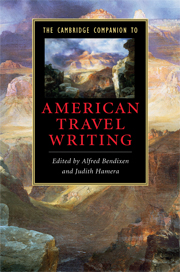Book contents
- Frontmatter
- Introduction: new worlds and old lands - the travel book and the construction of American identity
- Part I Confronting the American landscape
- Part II Americans abroad
- 6 American travel books about Europe before the Civil War
- 7 Americans in Europe from Henry James to the present
- 8 Americans in the Holy Land, Israel, and Palestine
- 9 Americans in the larger world: beyond the Pacific coast
- 10 South of the border: American travel writing in Latin America
- Part III Social scenes and American sites
- Chronology
- Further Reading
- Index
7 - Americans in Europe from Henry James to the present
from Part II - Americans abroad
Published online by Cambridge University Press: 28 March 2009
- Frontmatter
- Introduction: new worlds and old lands - the travel book and the construction of American identity
- Part I Confronting the American landscape
- Part II Americans abroad
- 6 American travel books about Europe before the Civil War
- 7 Americans in Europe from Henry James to the present
- 8 Americans in the Holy Land, Israel, and Palestine
- 9 Americans in the larger world: beyond the Pacific coast
- 10 South of the border: American travel writing in Latin America
- Part III Social scenes and American sites
- Chronology
- Further Reading
- Index
Summary
From the decade following the Civil War to the early years of the twenty-first century, American accounts of European travel reflect every conceivable variable of touring style and literary representation. Neither class nor color has effectively offered a bar to this journey; women as well as men, old as well as young, have penetrated every corner of Europe and recorded their experience in a multitude of contexts and narrative forms. Most of this work appears as non-fiction prose but the era also abounds in travel poetry and fiction popularly read as travelogue. In the course of this period the relation of Old to New World continuously evolves: as Europe becomes a field of carnage as well as the site of a museum past, the USA assumes a dominant role on the world stage. In the decades following World War II, Americans circulate as the inadvertent emissaries of a hegemonic power and typically travel en masse. Detaching themselves as they can from the group, writers of the European sojourn tour the cynosures of established pilgrimage but seldom halt there: absenting themselves from the grand boulevard and floodlighted cathedral, they seek a quaint, rural, pre-modern Europe or, alternatively, a contested, ravaged, reinvented Europe beyond the Cold War's breached partition. If here they find flowers, recipes, old peasant customs, everywhere they may also look misery straight in the eye. For a literature of leisure that traditionally affects to abandon high seriousness in pursuit of holiday pleasure, travel writing in this time frame excels in limning a world of twisted and tragic line.
- Type
- Chapter
- Information
- The Cambridge Companion to American Travel Writing , pp. 127 - 144Publisher: Cambridge University PressPrint publication year: 2009
- 6
- Cited by

